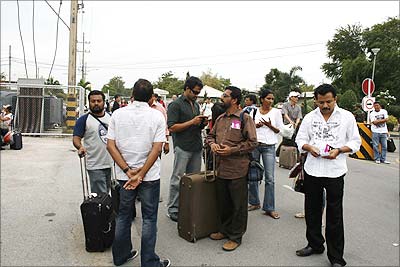 If Mumbai was shattered last week, then Bangkok was crippled. As in Mumbai, life creaked back to normalcy in Bangkok and Thailand -- only on Wednesday after a series of anti-government protestors strormed the domestic and international airports, leaving thousands of tourists from across the world. And that was for four days. The terror in Mumbai kept the media's preying eyes away from the South East Asian nation.
If Mumbai was shattered last week, then Bangkok was crippled. As in Mumbai, life creaked back to normalcy in Bangkok and Thailand -- only on Wednesday after a series of anti-government protestors strormed the domestic and international airports, leaving thousands of tourists from across the world. And that was for four days. The terror in Mumbai kept the media's preying eyes away from the South East Asian nation.
Among the people stranded was a Malayalam film unit comprising suave actor Prithviraj, actress Bhavana, ace cinematographer Azhagappan and director Shafi and script-writer Benny P Nayarambalam.
The unit shooting for the film Lollypop landed back in India three days later, behind schedule. Though it was a harrowing experience for three days -- where they had to stay put in a tent outside the airport -- the touring team, he says, was made to feel at home by the Thailand government.
Azhagappan tells rediff.com why India should take a leaf out of Thailand in disaster management. At a time when the Indian government -- and the politicians -- are under fire, it is interesting to note that a stranded tourist is heaping praise on a government and its politicians. And that, too, for effective handling of a crisis.
Over to Azhagappan
"It was scary. The unit members, especially Prithviraj and Bhavana, were worried. We had no clue about the possible date when we could leave. More than anything that kept us worried. The situation seemed like it would never end. At least 200,000 people were stranded at the airport and outside. There were no flights to anywhere, or landings too. The protesters did not allow anything though they resorted mostly to peaceful means.
"But I should admit that the Thailand government did manage the situation very well. Alternative arrangements had been made to accommodate the stranded tourists. One can't imagine the extraordinary efforts the government took to pacify tourists who were taken by surprise. It is a lesson in crisis management.
"The volume of tourists -- both domestic and international -- may have swelled every hour, but not once did the government blink. The food supply was amazing, and was on time. Temporary shelters were put up, makeshift toilets set up, special music programmes aired on channels. The music was aimed at soothing the worried souls. That shows how much prepared they were.
"The siege became a picnic. We were under a blockade, but never felt the repercussions. It has to be seen to be believed how efficiently the system worked at the time of a crisis. Fleets of buses were used as makeshift toilets. The buses would be off to the outskirts and come back cleaned.
"It is obvious that comparisons lead to India had there been a similar situation. It would have been complete chaos. I strongly believe that it will take at least 20 years for us to match that type of disaster management systems. In fact, the protests were aimed at the government, but it was they who made everyone at home. It is unique in it own way.
"Finally, after being marooned in a sea of protests, we took off from the Utapo airport. True that we were worried, having had to stay in makeshift shelters and the film's release date. But as the flight hovered over the airport, we said a quite 'Thank You' to the government.
Why Thailand is protesting: The protests are led by the People's Alliance for Democracy, which claims the government is corrupt and hostile to the country. To put it in simple words, it is a 'war' against the country's poor against the elite.
In what could be called as success to the protestors, Thailand's top court has banned many top members in the ruling coalition from contesting polls.
Text: Rajaneesh Vilakudy
In the picture: Prithviraj, Azhagappan, Benny P Nayarambalam and Shafi outside the Utapo airport.






 © 2025
© 2025